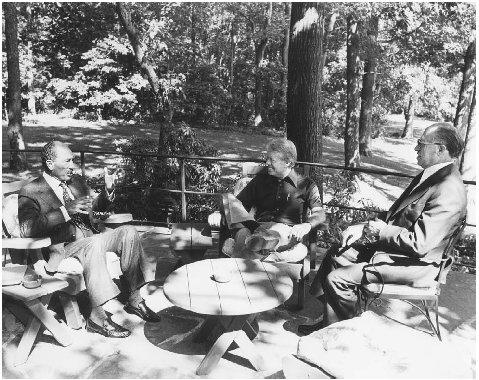Amid the tension between Israel and its neighboring countries, Jimmy Carter reached out to Middle-Eastern Conflict. With President Carter, Israel and Egypt achieved peace through 13 days of negotiations at Camp David.
This was the territory that was owned by Israel before the Six-Day War. Israel does not occupy the West Bank, Gaza Strip, or Golan Heights. Photo Source: CU Map Library, 1988
In 1947 the United Nations voted to partition that there be an established Jewish State. Arabs opposed this partition, but when the vote ended in 1948, Israel was established. Immediately after Israel proclaimed its independence, the Arab-Israeli war erupted. During this war, Egypt controlled the Gaza Strip, a strip of land bordering Egypt and Israel. Jordan controlled the West Bank, a chunk of land, east of Jerusalem and west of the Jordan River.
This image exhibits the territory that Israel acquired during the Six-Day War. Israel tripled the amount of land that they had previously. Photo Source: CU Map Library, 1972
In 1967, the Six-Day War broke out. During this war, Israel took control of both the Gaza Strip and the West Bank. Also, Israel took control of Golan Heights, a patch of Syrian land on the northeastern border of Israel. One of the great victories for Israel in this war was acquiring the Sinai Peninsula. Within this enormous landmass, there's the Suez Canal. This canal is a significant economic aspect for Egypt, and for Israel to acquire it was a big deal. Also, it was a considerable aspect of the actual accords, because it was the central part of the trade that Israel gave to Egypt in return for other things.

The movement of troops during the Yom Kippur War. Egyptian and Syrian forces (red), Israel forces (blue). Photo Source: Association for Diplomatic Studies & Training
In 1973, Egypt and Syria, launched a surprise attack on Israel, on their most holy day of the year, Yom Kippur. Taking Israel by surprise, Egyptian forces swept deep into the Sinai, gaining land. Soon after, Israel counterattacked and regained all the territory previously stolen, and a few bits more in Golan Heights. At the end of this war, tensions were high between the countries.

This is precisely why Camp David was the perfect spot for negotiations. It was very secluded, and the public didn't bother anyone. Photo Source: Gale In Context: World History, 1978
In November of 1977, Sadat publicly said that he would come over to the Knesset, the Israeli Parliament himself, to try to form peace. This was the starting point of the Camp David Accords. At the time, this completely broke the ideological barrier between the countries. He traveled for three days to Israel. He met with Menachem Begin and talked in front of the Knesset, during his historic visit. Later that year, a deadlock ensued, and no improvements were made by either Sadat or Begin. That's when Carter reached out to the leaders. In September of 1978, Maryland Carter, President Carter's wife, suggested that he should take both leaders to Camp David, the United States presidential retreat, so that the public doesn't bother the leaders. Carter acknowledged what she said and invited both leaders. Both of them accepted, and the negotiations started on September 5, 1978.
Previous Page: Thesis
Next Page: Breaking Barriers